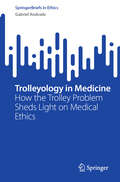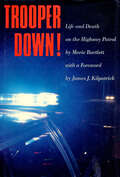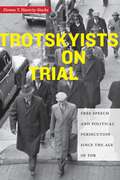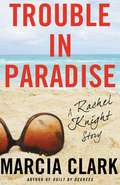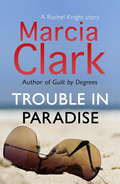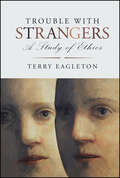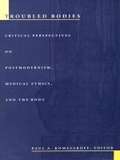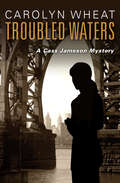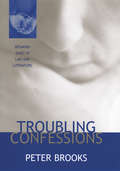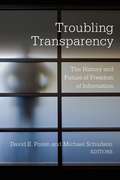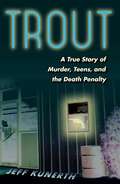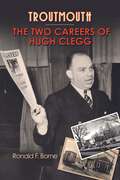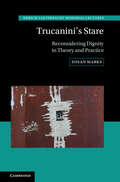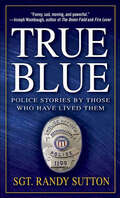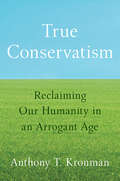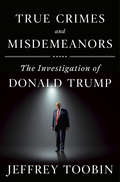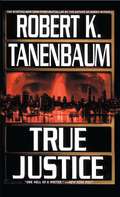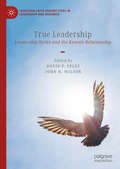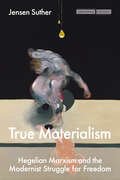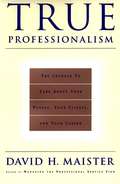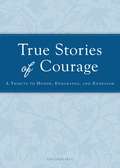- Table View
- List View
Trolleyology in Medicine: How the Trolley Problem Sheds Light on Medical Ethics (SpringerBriefs in Ethics)
by Gabriel AndradeThis book provides an overview of how the intricacies of the Trolley Problem shed light on various aspects of medical ethics. It shows how trolley dilemmas have become useful to ethicists to the extent that they activate intuitions and provide guidance about what the relevant moral principle ought to be in judging specific actions. Issues are covered at length such as euthanasia, where it is important to determine a relevant difference between killing and letting die; and abortion, where it is necessary to establish if harms can be used as a means to an end. While specialists in medical ethics have argued about these topics at length, few have established connections with the complexities of trolley cases. The Trolley Problem has now become a staple of pop culture and yet, outside philosophy, few people understand its implications. Consequently, this book is of interest to those with a general interest in philosophy, students, researchers as well as those in the healthcare industry where many of the difficult moral decisions encountered are better informed by framing them around the intricacies of the Trolley Problem.
Trooper Down!: Life and Death on the Highway Patrol
by Marie Bartlett James J. KilpatrickIt’s a trooper’s worst nightmare. What begins as a routine patrol suddenly turns violent when someone pulls a weapon. Moments later, the trooper is down—wounded or dead. Then, like a swarm of angry bees, every other trooper on the force mobilizes to catch the suspect. Whether they’re issuing a ticket for speeding “just a little” over the limit or conducting an all-out manhunt, the people who have chosen this perilous and demanding profession are rarely revealed as vividly or candidly as they are here. In Trooper Down! Marie Bartlett uses her gripping hell-for-leather style to paint a fascinating portrait of one of the nation’s most elite law-enforcement agencies. In interviews and anecdotes, troopers relate stories of narrow misses, breathtaking confrontations, strange and hilarious encounters with various “crazies,” and, most heartbreakingly, working the wrecks—aiding the injured and dying in highway accidents—while troopers’ wives and widows tell of the heart-wrenching realities trooper families face. Through this remarkable book, we not only comprehend the life of a trooper, we are unforgettably there.
Trophy Hunting
by Adam Hart Nikolaj BichelThis book gets to the heart of trophy hunting, unpacking and explaining its multiple facets and controversies, and exploring why it divides environmentalists, the hunting community, and the public. Bichel and Hart provide the first interdisciplinary and comprehensive approach to the study of trophy hunting, investigating the history of trophy hunting, and delving into the background, identity and motivation of trophy hunters. They also explore the role of social media and anthropomorphism in shaping trophy hunting discourse, as well as the viability of trophy hunting as a wildlife management tool, the ideals of fair chase and sportsmanship, and what hunting trophies are, both literally and in terms of their symbolic value to hunters and non-hunters. The analyses and discussions are underpinned by a consideration of the complex moral and practical conflicts between animal rights and conservation paradigms. This book appeals to scholars in environmental philosophy, conservation and environmental studies, as well as hunters, hunting opponents, wildlife management practitioners, and policymakers, and anyone with a broad interest in human–wildlife relations.
Trophy Widow: A Rachel Gold Novel (Attorney Rachel Gold Mysteries #7)
by Michael A. KahnBudapest, 1956. In this darkest year in the modern history of Hungary, a national uprising against Soviet occupiers and their reign of terror is underway. Eleven-year-old Evike and her firebrand mother steal deep into battle zones in support of civilian freedom fighters armed only with primitive weapons and desperate courage against the heavy artillery of trained Russian troops. Taken in for interrogation by the secret police, little Evike spins a story to deflect attention from her mother's revolutionary activities. A story that will irrevocably alter a number of lives and reach its tentacles, thirty years later, into the life of Ildiko Palmay.Chicago, 1986. Ildiko, 37, a librarian and ESL teacher, the American-born daughter of Hungarian refugees, is caught in a web of guilt and regret over her mother's mystifying death. Unsettled by her life and her romantic failures, she finds herself suddenly and unexpectedly drawn back to her roots, first to the Hungarian neighborhood of her youth in Chicago—and eventually to the Russian-occupied city of Budapest. Along the way, she meets a magnetic man who may not be what he seems, uncovers a trail of secrets and betrayals that eventually intersect with the tangled knot of the mother-daughter participants in the Revolution—and she discovers the shocking truth about her mother's death.Triptych is the suspenseful unfolding of two parallel stories of mother and daughter relationships forged in the brutalities of the 1956 Hungarian revolution. Triptych is about survival, displacement, the corrosive power of secrets, and, ultimately, the healing power of forgiveness.
Trotskyists on Trial: Free Speech and Political Persecution Since the Age of FDR (Culture, Labor, History #1)
by Donna T Haverty-StackePassed in June 1940, the Smith Act was a peacetime anti-sedition law that marked a dramatic shift in the legal definition of free speech protection in America by criminalizing the advocacy of disloyalty to the government by force. It also criminalized the acts of printing, publishing, or distributing anything advocating such sedition and made it illegal to organize or belong to any association that did the same. It was first brought to trial in July 1941, when a federal grand jury in Minneapolis indicted twenty-nine Socialist Workers Party members, fifteen of whom also belonged to the militant Teamsters Local 544. Eighteen of the defendants were convicted of conspiring to overthrow the government. Examining the social, political, and legal history of the first Smith Act case, this book focuses on the tension between the nation’s cherished principle of free political expression and the demands of national security on the eve of America’s entry into World War II. Based on newly declassified government documents and recently opened archival sources, Trotskyists on Trial explores the implications of the case for organized labor and civil liberties in wartime and postwar America. The central issue of how Americans have tolerated or suppressed dissent during moments of national crisis is not only important to our understanding of the past, but also remains a pressing concern in the post-9/11 world. This volume traces some of the implications of the compromise between rights and security that was made in the mid-twentieth century, offering historical context for some of the consequences of similar bargains struck today.
Trouble in Paradise: A Rachel Knight Story
by Marcia ClarkWith her besties Bailey and Toni in tow, Rachel leaves work and rainy LA behind and sets off for a much needed vacation in Aruba. Greeted by glittering sand and a balmy breeze, the three friends can't imagine anywhere more perfect. But just minutes after hitting the beach, they're approached by a panicked young woman. A gofer on the biggest reality hit since "Survivor," she's lost the show's child star and must find her, now, before anyone else realizes she's gone. Rachel, Bailey, and Toni put their dreams of paradise on hold and embark on a whirlwind search for the girl--a search that ends with a twist so disturbing no one, not even a fortune-teller, could have seen it coming...
Trouble in Paradise: A Rachel Knight story (Rachel Knight)
by Marcia ClarkTROUBLE IN PARADISE is an all-new short story featuring Rachel Knight, star of thrillers GUILT BY ASSOCIATION and GUILT BY DEGREES. Rachel Knight and her friends Toni and Bailey are taking a break from their busy, crime-focussed lives with a trip to tropical island paradise Aruba. But trouble is never far away from these three, and on their first day their investigative skills are called on when a reality TV child star goes missing...
Trouble with Strangers: A Study of Ethics
by Terry EagletonIn this major new book, Terry Eagleton, one of the world’s greatest cultural theorists, writes with wit, eloquence and clarity on the question of ethics. Providing rare insights into tragedy, politics, literature, morality and religion, Eagleton examines key ethical theories through the framework of Jacques Lacan’s categories of the Imaginary, the Symbolic and the Real, measuring them against the ‘richer’ ethical resources of socialism and the Judaeo-Christian tradition. a major new book from Terry Eagleton, one of the world’s greatest cultural theorists investigates ethical theories from Aristotle to Alain Badiou and Slavoj Žižek engages with the whole modern European tradition of thought about ethics brings together personal and political ethics and makes a passionate case for political love
Troubled Bodies: Critical Perspectives on Postmodernism, Medical Ethics, and the Body
by Paul A. KomesaroffSetting out the implications of the postmodern condition for medical ethics, Troubled Bodies challenges the contemporary paradigms of medical ethics and reconceptualizes the nature of the field. Drawing on recent developments in philosophy, philosophy of science, and feminist theory, this volume seeks to expand familiar ethical reflections on medicine to incorporate new ways of thinking about the body and the dilemmas raised by recent developments in medical techniques.These essays examine the ways in which the consideration of ethical questions is shaped by the structures of knowledge and communication at work in clinical practice, by current assumptions regarding the concept of the body, and by the social and political implications of both. Representing various perspectives including medicine, nursing, philosophy, and sociology, these essays look anew at issues of abortion, reproductive technologies, the doctor-patient relationship, the social construction of illness, the cultural assumptions and consequences of medicine, and the theoretical presuppositions underlying modern psychiatry. Diverging from the tenets of mainstream bioethics, Troubled Bodies suggests that, rather than searching for the correct "coherent perspective" from which to draw ethical principles, we must apprehend the complexity and diversity of the discursive systems within which we dwell.
Troubled Waters (The Cass Jameson Mysteries #5)
by Carolyn WheatTo save her brother, Cass must put a cop killer behind bars In 1982, Jan Gebhardt was smuggling illegal immigrants across the Canadian border when a federal agent got in her way. Jan was arrested for his murder, and her boyfriend, Ron, was booked as an accessory. When Jan went into hiding, the charge against Ron was put on hold. Fifteen years later, she emerges to face what she&’s done—and drags Ron right down with her. Brooklyn attorney Cass Jameson wouldn&’t give a damn about Jan Gebhardt if it weren&’t for the fact that Ron is her brother. He&’s also a wheelchair-bound Vietnam veteran. She is about to try a separate case when she learns that her brother is facing prison time. Cass gets a forty-eight-hour adjournment from the judge. She has two days to get Ron out of trouble, but he still has feelings for Jan, and this case will destroy a few more lives before it&’s through.
Troubling Confessions: Speaking Guilt in Law & Literature
by Peter BrooksBrooks reflects on the extraordinary value that Western culture places on the act of confession, and the equally extraordinary problems that Western culture has assessing individual confessions.
Troubling Transparency: The History and Future of Freedom of Information
by Michael Schudson David E. PozenToday, transparency is a widely heralded value, and the U.S. Freedom of Information Act (FOIA) is often held up as one of the transparency movement’s canonical achievements. Yet while many view the law as a powerful tool for journalists, activists, and ordinary citizens to pursue the public good, FOIA is beset by massive backlogs, and corporations and the powerful have become adept at using it for their own interests. Close observers of laws like FOIA have begun to question whether these laws interfere with good governance, display a deleterious anti-public-sector bias, or are otherwise inadequate for the twenty-first century’s challenges.Troubling Transparency brings together leading scholars from different disciplines to analyze freedom of information policies in the United States and abroad—how they are working, how they are failing, and how they might be improved. Contributors investigate the creation of FOIA; its day-to-day uses and limitations for the news media and for corporate and citizen requesters; its impact on government agencies; its global influence; recent alternatives to the FOIA model raised by the emergence of “open data” and other approaches to transparency; and the theoretical underpinnings of FOIA and the right to know. In addition to examining the mixed legacy and effectiveness of FOIA, contributors debate how best to move forward to improve access to information and government functioning. Neither romanticizing FOIA nor downplaying its real and symbolic achievements, Troubling Transparency is a timely and comprehensive consideration of laws such as FOIA and the larger project of open government, with wide-ranging lessons for journalism, law, government, and civil society.
Trout: A True Story of Murder, Teens, and the Death Penalty
by Jeff KunerthOn a cool Pensacola night in January 1991, just a few minutes before midnight, three teenagers pulled up to the Trout Auto Parts store. Patrick Bonifay, his body coursing with adrenaline, entered the store clad in a ski mask carrying a loaded gun, intent on carrying out a poorly laid plan. Little did he know that it was his life--as well as the lives of his companions--that was about to be forever changed.Bonifay, Clifford Barth, and Eddie Fordham were hired to kill Daniel Wells by Robin Archer, who blamed Wells for losing his job nine months prior. The plan was orchestrated by the then-twenty-seven-year-old Archer, who allegedly promised his seventeen-year-old nephew, Patrick, a suitcase full of money after the job was done. But Wells had called in sick that night, and an innocent man was covering his shift.In this shocking and thought-provoking volume, Jeff Kunerth recounts the events of that fateful night, the swift investigation of the murder, the trials and sentencing of the teens, and their subsequent lives within the Florida court and penal systems. Kunerth uses the story of the Trout Auto Parts murder and the lives of these boys to explore varying aspects of troubled adolescence, impulsive actions lasting but moments, and the national trend of trying juveniles as adults in court.They were boys every teenager can identify with and circumstances every parent fears. Their story provides a disturbing, sad, and compelling inside look at the dynamics of individuals--not yet adults, but no longer children--who commit senseless, impulsive crimes. Trout is that rare book that continues to haunt you long after you've finished reading it.
Troutmouth: The Two Careers of Hugh Clegg
by Ronald F. BorneHugh Clegg (1898-1979) was among the most notable Mississippi historical figures during the 1920s through the 1960s. Born in Mathiston, Mississippi, he was a member of the Federal Bureau of Investigation from 1926 to 1954, during which time he rose to the top leadership and worked directly under Director J. Edgar Hoover and Associate Director Clyde Tolson. In his second career, as executive assistant to Chancellor J. D. Williams at the University of Mississippi from 1954 to 1969, he was in a top leadership position before and during the civil rights crises in the State of Mississippi and at Ole Miss.While with the Bureau, Clegg's responsibilities included leading the search for many of the most dangerous gangsters in the country, including John Dillinger, Baby Face Nelson, the Barker gang, and Alvin Karpis. He established the FBI's National Training Academy and coordinated the hunt for atom bomb spy Harry Gold, collaborator with German spy Emil Klaus Fuchs. He was sent to England by Director Hoover prior to the outbreak of World War II to study British intelligence agencies.A close friend of many of the leading federal and state elected officials and of members of the US Supreme Court, Clegg was well known to many in power. At the University of Mississippi he was the prime contact between the university and the federal government during the desegregation crises of Clennon King and James Meredith. He was also assigned the lead role in combating the efforts of Mississippi politicians to discredit and remove faculty members when scholars were thought "too liberal" and therefore a threat to the state.Through a Freedom of Information request from the FBI, author Ronald F. Borne obtained thousands of pertinent documents. In addition, he mined Clegg's oral history and an unpublished book manuscript. Borne interviewed close relations, colleagues, and friends to reveal a portrait of a distinguished, loyal man who significantly shaped the training procedures for the FBI and then mediated the University of Mississippi's conflicts with both state officials and the federal government.
Trucanini's Stare: Reconsidering Dignity in Theory and Practice (Hersch Lauterpacht Memorial Lectures)
by Susan MarksA central concept in international human rights law and many national constitutions is human dignity. Departing from established approaches to dignity in philosophy and legal theory, Susan Marks takes dignity in everyday life ('dignified care', 'dignity in the workplace', etc.) as a starting point for reconsidering the concept's history and significance. The result is a highly original work which gives particular attention to colonial and post-colonial engagements with dignity, and emphasises the character of human dignity as not just an idea or abstract value, but also a lived experience that cannot be understood without reference to social structures and the inequalities and hierarchies they reproduce. If dignity is an attribute which all human beings possess purely by virtue of being human, Marks shows that it is also an element within the systemic operations of privilege and power.
True American: Language, Identity, and the Education of Immigrant Children
by Rosemary C. SalomoneHow can schools meet the needs of an increasingly diverse population of newcomers? Do bilingual programs help children transition into American life, or do they keep them in a linguistic ghetto? Are immigrants who maintain their native language uninterested in being American, or are they committed to changing what it means to be American? In this ambitious book, Rosemary Salomone uses the heated debate over how best to educate immigrant children as a way to explore what national identity means in an age of globalization, transnationalism, and dual citizenship. She demolishes popular myths—that bilingualism impedes academic success, that English is under threat in contemporary America, that immigrants are reluctant to learn English, or that the ancestors of today’s assimilated Americans had all to gain and nothing to lose in abandoning their family language. She lucidly reveals the little-known legislative history of bilingual education, its dizzying range of meanings in different schools, districts, and states, and the difficulty in proving or disproving whether it works—or defining it as a legal right. In eye-opening comparisons, Salomone suggests that the simultaneous spread of English and the push toward multilingualism in western Europe offer economic and political advantages from which the U.S. could learn. She argues eloquently that multilingualism can and should be part of a meaningful education and responsible national citizenship in a globalized world.
True Blue: My Journey from Beat Cop to Suspended FBI Whistleblower
by Stephen FriendA suspended special agent explains his decision to turn whistleblower and expose FBI politicization and abuse against conservative America.Stephen Friend had his dream job as an FBI special agent. After nearly a decade of combating violent crime, human trafficking, and child predators, he was reassigned to the FBI&’s unprecedented investigation of the political unrest at the United States Capitol on January 6, 2021. Friend soon uncovered efforts by the FBI and Department of Justice to manipulate statistics and exaggerate the nationwide threat of domestic terrorism. Friend spotlighted how the politicized FBI was cooking the books to support an ongoing narrative from the Joe Biden administration to label Donald Trump voters as violent extremists. Friend witnessed overzealous practices to harass conservative Americans and realized the FBI was turning its investigative processes into a punishment. When the married father of two made his bombshell allegations in a whistleblower disclosure, leaders within the FBI exposed themselves as partisan, ambitious players who insisted that January 6th protestors killed police officers and attempted to seize American democracy. Hell-bent on suppressing Friend from exposing the truth, FBI officials seized his gun and badge and suspended him from working as a special agent. In this memoir, Friend reflects on the lessons and life experiences that led him to ultimately risk his career to uphold his FBI special agent oath to protect and defend the United States Constitution against all enemies—both foreign and domestic.
True Blue: Police Stories by Those Who Have Lived Them
by Randy SuttonAfter September 11, 2001 Las Vegas Police Sergeant Randy Sutton began soliciting writing from law enforcement officers-his goal being to bridge the gap between the police and those they serve, with a book that offers a broad and thoughtful look at the many facets of police life. Hundreds of active and former officers responded from all over the United States: men and women from big cities and small towns, some who had written professionally, but most for the first time. Sutton culled the selections into five categories: The Beat, Line of Duty, War Stories, Officer Down, and Ground Zero. The result is True Blue, a collection of funny, charming, exciting, haunting stories about murder investigations, missing children, bungling burglars, car chases, lonely and desperate shut-ins, routine traffic stops, officers killed in the line of duty, and the life-changing events of September 11. Here, officers reveal their emotions-fear and pride, joy and disgust, shame and love-as they recount the defining moments of their careers. In these stories, the heart and soul behind the badge shines through in unexpected ways. True Blue will change the way we think about the deeply human realm of police service.
True Conservatism: Reclaiming Our Humanity in an Arrogant Age
by Anthony T. KronmanDrawing on the riches of the Western tradition, Anthony T. Kronman defends a humane conservativism for our enlightened age As the party of the left has grown more strident, its conservative critics have responded in kind. Each year conservatives do a poorer job of defending their position as a citadel of human values without lapsing into an angry assault on ideals that they and progressives share. It becomes harder to see the enduring appeal of a true conservatism that celebrates the worth of custom and inheritance; the splendor of what is excellent and rare; the expansive solidarity of our friendship with the dead; and the dignity, indeed necessity, of our longing for a connection to the eternal and divine—while affirming that these timeless human goods are compatible with the modern ideals of equality, toleration, and reasoned argument. In this bracing book, Anthony Kronman defends a conservative philosophy of life that respects our enlightened ideals but decries the damage their arrogant simplification causes in our moral, political, and spiritual lives. Drawing on the work of Aristotle, Cicero, Spinoza, Burke, Hume, Madison, Tocqueville, Lincoln, Arendt, Heidegger, and others, he argues that humanism is conservatism, today as in the past. He reminds us that our humbling parameters make possible every form of human greatness, every human glory, every human love worthy of the name.
True Crimes and Misdemeanors: The Investigation of Donald Trump
by Jeffrey ToobinFrom CNN chief legal analyst and bestselling author Jeffrey Toobin, a real-life legal thriller about the prosecutors and congressional investigators pursuing the truth about Donald Trump's complicity in several crimes--and why they failed.Donald Trump's campaign chairman went to jail. So did his personal lawyer. His long-time political consigliere was convicted of serious federal crimes, and his national security advisor pled guilty to others. Several Russian spies were indicted in absentia. Career intelligence agents and military officers were alarmed enough by the president's actions that they alerted senior government officials and ignited the impeachment process. <P><P>Yet despite all this, a years-long inquiry led by special counsel Robert Mueller, and the third impeachment of a president in American history, Donald Trump survived to run for re-election. Why?Jeffrey Toobin's highly entertaining definitive account of the Mueller investigation and the impeachment of the president takes readers behind the scenes of the epic legal and political struggle to call Trump to account for his misdeeds. With his superb storytelling and analytic skills Toobin recounts all the mind-boggling twists and turns in the case--Trump's son met with a Russian operative promising Kremlin support! <P><P>Trump paid a porn star $130,000 to hush up an affair! Rudy Giuliani and a pair of shady Ukrainian-American businessmen got the Justice Department to look at Russian-created conspiracy theories! Toobin shows how Trump's canny lawyers used Mueller's famous integrity against him, and how Trump's bullying and bluster cowed Republican legislators into ignoring the clear evidence of the impeachment hearings.Based on dozens of interviews with prosecutors in Mueller's office, Trump's legal team, Congressional investigators, White House staffers, and several of the key players, including some who are now in prison, True Crimes and Misdemeanors is a revelatory narrative that makes sense of the seemingly endless chaos of the Trump years. <P><P>Filled with never-before-reported details of the high-stakes legal battles and political machinations, the book weaves a tale of a rogue president guilty of historic misconduct, and how he got away with it. <P><P><b>A New York Times bestseller</b>
True Justice (A Butch Karp-Marlene Ciampi Thriller #12)
by Robert K. TanenbaumNew York Times bestselling author Robert K. Tanenbaum has more than seven million copies of his finely crafted and morally complex novels in print. In True Justice, he reaches new heights with a compellingly authentic and penetrating story pulled right form today's most controversial headlines.For Butch Karp, chief assistant district attorney for New York County, the nightmare begins when a shocking act of negligence results in homicide. Goaded by the media's sensational publicity, the public is screaming for blood, and Karp's boss, D.A. Jack Keegan, is listening. He has ordered the prosecution of a fifteen-year-old for murder, intent on making a very public example of the girl. A Hispanic from a poor neighborhood, she's an easy mark for big-city bureaucracy and bigotry. It is Butch Karp's unpleasant job to see that the prosecution gives the public what it wants: a quick and thorough administration of hard-line justice.Complicating matters further is Butch's wife, Marlene Ciampi, a private investigator who has decided to return to practicing law. Her first case takes her a few hundred miles south to a small Delaware town, where an equally unspeakable tragedy has taken place. Marlene, however, has the unenviable task of taking on a politically ambitious local prosecutor who is pressing to charge a suburban teenager with capital murder.With Butch and Marlene squaring off on opposite sides of an increasingly incendiary national debate, things couldn't get any more tense...until a shocking turn of events puts their daughter, Lucy, at the center of a horrifying crime. Suddenly, everything they believe in is challenged, and they are drawn into a maelstrom of big-city politics and small-town values, where justice is sacrificed to the twin gods of public perception and expediency -- and Karp must struggle to salvage his self-respect, his career, and his life.
True Leadership: Leadership Styles and the Kenotic Relationship (Christian Faith Perspectives in Leadership and Business)
by David P. Peltz John H. WilsonThis edited collection addresses several forms of moral leadership within the context of kenosis, bringing together both secular and biblical perspectives on the role of morality and self-sacrifice in effective leadership theory and practice. The contributors apply various leadership theories in the analysis of sacred texts in order to uncover unique insights into the biblical truth about leadership. Their analysis moves away from egotistical leadership focused on self-aggrandizement and provides a new model for leadership - one characterized by morality, authenticity, and service. True Leadership will benefit scholars, researchers, and students interested in values-based leadership and seeking to enrich their understanding of organizational behavior and leadership development.
True Materialism: Hegelian Marxism and the Modernist Struggle for Freedom (Cultural Memory in the Present)
by Jensen SutherIn recent years, there has been an explosion of interest in both Marxism and German Idealism across the humanities, but the discourse around the two traditions has grown stagnant and is still defined by the same century-old debates—materialism versus idealism, history versus logic, revolution versus reform. With this exciting new work, Jensen Suther endeavors to transform this discourse by presenting an unprecedented systematic vision of the possibility of a Hegelian Marxism, grounded in Aristotle's logic of living form. Through engagement with three titans of literary modernism—Franz Kafka, Thomas Mann, and Samuel Beckett—Suther pursues not only an account of Hegel's materialism but also a new critique of capitalist modernity. Breaking with the received view of Marx's relation to German Idealism, the book argues that the materialist critique of capitalist production is inseparable from Hegel's idea that the demand for freedom is a demand for mutual recognition. The implication for Marxist criticism is that literary works cannot be understood apart from the political struggle for both recognition and new forms of social production. Anyone invested in socialist politics, the future of literary theory, the history of philosophy, and the study of modernism will want to contend with the way Suther rethinks Marxist theory and literary criticism from the ground up, starting with their foundations in Hegelian thought.
True Professionalism: The Courage to Care About Your People, Your Clients, and Your Career
by David H. MaisterDavid Maister, the world's premier consultant to professional service firms, vigorously challenges professionals to examine this essential, yet under-addressed question: What is true professionalism?Professional firms are forever trying to get their people to act like professionals—to do the right things. Though their various incentives may create employee compliance, these don't often encourage excellence. His answer is clear: It is believing passionately in what you do, never compromising your standards and values, and caring about your clients, your people and your own career. In clear and compelling terms, Maister shows that this approach is not only ethical but also conducive to commercial success.
